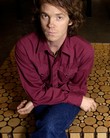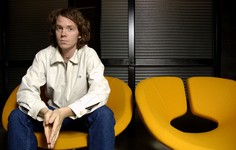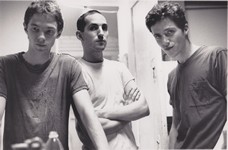
 US - Massachusetts / US - New York - Full Moon 192 - 05/06/12
US - Massachusetts / US - New York - Full Moon 192 - 05/06/12
Chris Brokaw
The Codeine story
Passing by very slowly
Over 20 years ago, the New York trio Codeine, Steve Immerwahr on bass and vocals, John Engle on guitar and Chris Brokaw on drums, decided to play their indie rock
very slow, yet with a lot of aggression. By doing so, they pretty much single-handedly invented a genre that would later be dubbed 'slowcore', and also influenced a long
list of bands along the way. They disbanded in the mid-90s after two albums and one EP, but now the original line-up (Chris Brokaw had left in 1992) gets back together
for a limited run of highly anticipated shows to highlight the release of the lavish 6 LP and 3 CD box set When I See The Sun by the Numero Group. Recently, Chris
Brokaw was kind enough to answer our questions.
Luna Kafé: Reading some old reviews I couldn't help noticing that people frequently mentioned how different Codeine sounded at the time. This may be a silly question,
but were you actually aware of this - did you even set out to do/be just that - or were you just too close to it all to even notice? Also, how did you originally bond?
Chris Brokaw: We knew we were doing something different. We had a really specific set of ideas we were going for. Most specifically, Steve had come up with this
idea of a music that, as John paraphrased it, "passed by very slowly"... there was a lot more to it than that, of course...I always felt a big component was this idea
of being constrained, or of being paralyzed... There was also a great confrontation to the music, a kind of violence. This was especially true live. Mixed with a lot of
intimacy and fragility. We were trying to balance a lot; but we all sort of knew what we were getting at.
Steve and I bonded over his songs, and some of Nikki Sudden's songs, too. I think Steve really liked John right away, when they met in New York, and Steve decided that
John had to be the guitar player for Codeine (and in fact Codeine is basically the only band John has ever been in).
LK: I guess you're approach was sort of experimental, however, it seems remarkable how fully developed it already is on the first release, with seemingly
little need to change it much further down the road. Is this just due to the general sparseness of the sound or did you really work up ideas like crazy behind closed
doors before you found something that was as good as what you released on Frigid Stars LP?
CB: Steve and John had been working on the music for about a year before I started with them; but, yes, we just worked in private on it. We worked sporadically
for the first year (1989-90), but it all became pretty realized by the time we did the record in the summer of 1990. Side A of Frigid Stars LP was our 4-song
demo tape for Glitterhouse; I think there's a huge difference on Side B, which we recorded 2 months later. A lot changed in those 2 months. Side B is much more monolithic
and disciplined than Side A; we had learned to play Codeine music. -- It took me some time before this music felt natural to play, but once it did, I think it altered
me.
LK: Looking at all the great indie rock that came from the US in the late 80s/early 90s it still seems odd that you had to make a detour to Germany to get
your first album released on Glitterhouse...
CB: We didn't know anyone, we didn't know any labels. Bitch Magnet were on Glitterhouse, and Steve did a tour with them mixing sound in Europe, Fall of 1989; and
every night he would go up and sing the Codeine song "Pea" with Bitch Magnet. At the end of the tour they recorded the 12" "Valmead", which included "Pea"; Glitterhouse
loved the song and wanted to hear more. -- I always thought it was funny that a German label signed the band, which included "Mr. Always True" on bass and "Mr. Angel"
on guitar.
LK: I guess the heavy touring activity in Europe was partly due to the German deal, or did you really feel more welcome over here initially?
CB: Our first deal was with Glitterhouse; Frigid Stars LP came out a year or so later on Sub Pop. So it made sense to tour Europe first. And Bastro invited
us to tour with them in Fall of 1991. Really, we had no idea what to do or how to do it! We were fairly reactive. After I left the band, they started touring the US as
much as Europe.
LK: It seems that David Grubbs' involvement is a bit of a mystery to some Codeine fans. I guess if you were a jazz band, nobody would have raised an eye
regarding his track on Barely Real, but in indie rock is was a bit of an interesting concept, wasn't it?
CB: Grubbs was just starting to break some ground with what could happen on an "indie rock" record. We welcomed it. Barely Real wasn't what we had originally
intended, so, it became more wide-open.
 LK: They say the third album is the difficult one, but with Codeine it seems that the 2nd was the tricky one, seeing that it was more of an EP than an album
in the end. But it was intended to be a full LP, initially?
LK: They say the third album is the difficult one, but with Codeine it seems that the 2nd was the tricky one, seeing that it was more of an EP than an album
in the end. But it was intended to be a full LP, initially?
CB: The 2nd record was supposed to be called The White Birch. We recorded almost an album's worth of material, and scrapped it all. Some of those versions
are being included in the reissues; many of the songs were re-recorded with Doug Scharin and got onto the ultimate White Birch. We had a difficult time realizing
what we were trying to do. Frigid Stars LP was easy; everything after that was very difficult. -- But I'm really, really happy that a lot of this unreleased stuff
is finally coming out. The version we did of "Wird", for example, was, I always thought, the single best performance our line-up ever recorded; the most successful take
on what we were trying to do. It was tremendously frustrating to not release that. I'm really glad it's finally coming out.
LK: I know that you left Codeineecause you had a more prominent role in Come, so gaining more input in Codeine was never an option?
CB: I never wanted to write songs for Codeine. Steve wrote the songs, and I was such a fan of what he did - it was so unique and so singular. I had a very active
role in how that music was executed, but I didn't feel I needed to write songs for it.
LK: Once you left, did you ever look back? Did you actually get to see them with the later line-ups and if so, what did you think/feel?
CB: Oh man, it broke my heart to leave the band. The last 6 or 8 months of the band had been very difficult; very frustrating. We had such a hard time realizing
what we were trying to do. But it was still hard and heavy to leave. I remained friends with them and saw them live several times, with Josh and with Doug. Those guys
are both great drummers, but I never felt like either were totally right for the band. But I'm probably not the best person to ask. I was really attached to that music
and very particular about the way to play it.
LK: Much has been said about all the bands that Codeine have influenced. Do you remember the first time somebody brought up the subject of "being influenced
by Codeine"?
CB: Yeah, it was when we were still a band. For some reason we used to play a lot with Sebadoh (back when they were a 2-piece, Lou and Eric, and basically doing
terrorist performance art), and one time we went to see them, as a 3-piece, and they did a really slow, sparse song, and at the end the whole audience yelled "COOOOOO-DEINE!"
and Lou very sheepishly said, "yeah, you're right, we know, we know...." People knew what we were doing, and I think it started effecting things right away. It's hard
to quantify but I think we added something to the culture.
LK: Still, are you surprised by the reaction that even the announcement of the imminent reunion provoked?
CB: I'm not surprised at all, because for many years people have said to me, "if you guys ever play again, anywhere, let me know, and I'll be on a plane to come
see it." And strangers have asked me about the band constantly, particularly in the last ten years. I think interest in the band grew. but I admit that I was shocked
to see the tour announced in the US Rolling Stone. That was weird!
LK: In recent interviews you mentioned that you never really left a band acrimoniously, so reuniting with old collaborators is often very easy. Yet with Codeine
it took a long, long time. Were you just waiting for the right opportunity? Or did you feel stronger about the band's legacy and needed more preparation because of that?
CB: We didn't feel the need to play again. We were done. All Tomorrows Parties started asking us to play about 7 years ago, and we just didn't feel like there was
any need to. Steve told me at one point, "when I wrote those songs, I REALLY NEEDED to sing those songs. and I don't need to sing them anymore." Which is hard to argue
with. We're only playing shows because Numero Group is doing this amazing reissue. We were totally flattered by the time and care they put into it, and thought that it
made sense to play shows simply to spotlight the releases. But for myself... I have all this new music I'm constantly working on. I'm proud of what Codeine did, I think
it stands up over time; and I'm happy to revisit it with these guys in this context, and I'm certainly prioritizing all this Codeine activity right now. But I have 4 new
records of my own coming out this year and that's what I'll be focusing on once this is all done.
LK: As far as the box set is concerned: There's a lot of extra material. Did you have all of that ready to go all along or did compiling this ask for long hours
in damp basements and the like?
CB: We went through this process several years ago - there was another label that proposed a very similar type of reissue. That didn't pan out, but at the time
we sifted through a lot of stuff. This time around, Numero asked to give them everything we had, and helped curate it to some extent. But we also had to do some physical
digging around for stuff that proved challenging at times.
LK: Looking back on it - how happy are you with what was originally released when you listen to the extra tracks now? I know one would always do things a
little different later on, but are there any real regrets?
CB: No real regrets. I'm very happy that some more of the story is being revealed. Part of that is just as a fan of some great songs that never came out - "Skeletons",
"Summer Dresses", "Kitchen", "Corner Store", and especially "Median". Amazing songs. I'm happy too for some good performances we did together to finally come out.
LK: The proper tour is starting in May, but you did play one show in Seattle in April already. What were your impressions?
CB: I felt like we were really well-prepared - we had put a lot of time and thought and rehearsal in. The band morale was really, really good. The whole process
and experience still felt somehow fragile, but, I think it will get stronger as it goes on.
 LK: How do you approach these live shows? Try to get back in the same frame of mind as way back when (at least as much as that's possible)? Or did you really
set out to play these songs through the eyes of the people that you are now?
LK: How do you approach these live shows? Try to get back in the same frame of mind as way back when (at least as much as that's possible)? Or did you really
set out to play these songs through the eyes of the people that you are now?
CB: I don't think I look at it in either of those ways. Where I was then and where I am now don't really have much to do with it. Just playing and inhabiting the
songs is enough. Some songs will bring back some of the same feelings I had then, and I can identify them, but that's a by-product of the song remaining powerful. I think
the main thing is to honour the songs Steve wrote back then. I feel that we all made good choices back then, and that very little of that needs re-assessing. There is
always a lot of discussion about tempo, and John and Steve have conceded that the band may have, eventually, been playing too slowly. So there is some push-and-pull between
what the band was doing then, particularly towards the end, and how we'd like to present those songs now.
There's a song on The White Birch called "Washed Up" that we actually discussed re-recording for the box set - this was John's idea. but it was a while ago
and we eventually let it drift. We thought it could be kind of thrilling or tantalizing to have a bonus 7" of new recordings, but we never pursued it.
LK: I know that the box set probably only came about now because of contracts ending...
CB: Not true! it was just Numero Group wanting this stuff to be on vinyl. Our contract with Sub Pop is 'IN PERPETUITY': they own the masters forever. Which for
a long time I thought was a really stupid contract for us to have signed, but in retrospect it was actually great because they've kept the CDs in print and, most crucially,
in stores. It's all been out of print in Europe for about 11 years, and I'm glad this will at least make the music more available there again.
LK: But during this whole process of putting together the box set and the shows - did you ever think: We should've done this years ago?
CB: No, no, never. I've never been in any kind of hurry to do this. Carsten, you know how busy I've been! I'm glad we're doing it now, and mostly just because it's
so nice to be working so closely with John and Steve.
LK: I'm afraid the law requires me to ask this: Will it really be all over again once you have played those rescheduled Japanese shows this coming Fall?
CB: That's the plan.
Colour pictures: Copyright © 2012 Anthony Saffrey
Black and white picture: Copyright © 1990 Laura Larson
Copyright © 2012 Carsten Wohlfeld 
|

 LK: They say the third album is the difficult one, but with Codeine it seems that the 2nd was the tricky one, seeing that it was more of an EP than an album
in the end. But it was intended to be a full LP, initially?
LK: They say the third album is the difficult one, but with Codeine it seems that the 2nd was the tricky one, seeing that it was more of an EP than an album
in the end. But it was intended to be a full LP, initially? LK: How do you approach these live shows? Try to get back in the same frame of mind as way back when (at least as much as that's possible)? Or did you really
set out to play these songs through the eyes of the people that you are now?
LK: How do you approach these live shows? Try to get back in the same frame of mind as way back when (at least as much as that's possible)? Or did you really
set out to play these songs through the eyes of the people that you are now?